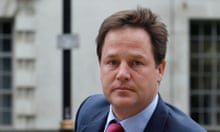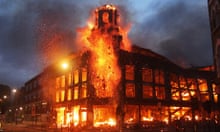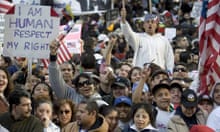After a week of burning cities and tumbling stock markets, it is some comfort to know there is one western society not yet quite trembling on the brink of collapse.
It's a country where people are living longer and feeling healthier, where household wealth doubled between 1987 and 2009; crime is at a historic low, divorce rates falling, abortion rates, too.
Not a bad record for broken, sick, morally bankrupt old Britain (for yes, they do mean us: those findings are from the UK's annual Social Trends report, released on Thursday as MPs were variously demanding tax breaks to support marriage and internment of rioters in Wembley stadium). Not a bad reminder of the power of governments occasionally to improve our lot, however fashionable it has become to decry the state. One shocking, frightening week shouldn't plunge us completely into self-loathing.
Nonetheless, it's clear this government now confronts both economic and social forces that it does not entirely control. And by a politician's response to crises such as this shall you know them.
The past few days have shattered some of the illusions necessary to a comfortable life. There was a point in the small hours of Sunday night when many Londoners realised that if anyone chose to attack them now – kick the door down, rob, burn, or worse – they were probably on their own: the police were overrun. What sticks in the mind from Thursday's debate was MP after MP reporting their bewildered constituents' plaintive question: "Where were the police?'' The state let them down, and that's not easily forgotten.
So the prime minister, when he eventually returned from Italy, asserted the full power of that state. He threatened to evict looters from their council homes, injunct gang members, restrict access to social media (presumably the same social media that allows police to gather intelligence, or arrest those stupid enough to brag on Twitter). Suddenly a decentralising prime minister was pushing at the boundaries of executive power and operational independence, lecturing police on tactics and dropping fat hints over sentencing to the judiciary.
Perhaps, as the panic subsides, it will be back to hands off the tiller again. Some of last week's hazier ideas may be dropped: and while the prime minister publicly clings to one flagship small-state policy, planned police cutbacks, don't bet against a compromise on that. David Cameron has learned that it's easy to be a small-statist, a decentralist, even a libertarian, in opposition: harder (but sometimes more important) when the pressure's on and the levers in your hands.
Cheered on by rightwingers who were all for shrinking the state 10 days ago and now all for mobilising the army, he asserts the power of welfare state and security state to conquer all. His message was "Yes, we can", because admitting governments sometimes shouldn't or can't risks undermining confidence. Which made it all the more striking that he was followed to the dispatch box by the Tories' chief exponent of "No, we can't".
George Osborne came to tell us he has not much to tell us about preventing a double-dip recession. Britain is a safe haven in a storm, he insisted, while acknowledging that the storm is blowing closer and the global hatches not battened down (there were "political not economic" obstacles to a concerted international response, shorthand for governments blocking a deal). But beyond another sideswipe at employment rights this autumn, there was little new from the Treasury. In Number 10, the state is back in vogue: not yet in Number 11.
The chancellor is arguably just being realistic. If the US or eurozone economies implode, there may not be much to do but hunker down and hope. Politicians don't have much more practical control over a global banking crisis than over the kind of parents who don't bother coming to court when their teenage children are in the dock. But governments still have the illusion of control, and that's not as puny as it sounds.
There has been much talk of the belated show of police force being a "surge", a military term familiar from Iraq and Afghanistan, where that means trying to break a bloody stalemate by flooding volatile areas temporarily with troops. Surges are designed not to eliminate a threat but subdue it long enough for the occupying force to retreat with dignity, leaving what's left for others to contain. Downing Street's tough talk was a rhetorical surge: the European Central Bank's market intervention on Monday was a mini-surge too, the bank defiantly projecting a firepower it probably can't sustain. Both had an element of bluff.
Political surges can be merely sound and fury, signifying nothing: the inner cities have seen plenty of those, including from the man who has perhaps most influenced Cameron's thinking on crime. As he put it, some offences are "like hammer blows struck against the sleeping conscience of the country… the ugly manifestations of a society that is becoming unworthy of that name".
The speaker was Tony Blair after the 1993 murder of the toddler James Bulger: and it suggests that what happened last week isn't really new, nor is it proof that society is somehow more "sick" than it was 18 years ago. We might ask not where this "new" threat comes from but why successive governments haven't made it go away.
The Tory analysis is that the state is to blame: too much welfare, not enough personal responsibility. In 1993, Blair similarly suggested individual responsibility was too far subsumed by the state, although he blamed years of Tory rule for breaking down social bonds. Yet in his recent biography, he says he is no longer sure of his analysis.
For his part, Ed Miliband was wise to resist blaming the spending cuts, since this phenomenon clearly hasn't arisen in one short year. And since half the rioters in court on Thursday were of an age to have been educated and mostly parented under New Labour, the party should be humble enough to take some responsibility for something it didn't cause but certainly didn't solve.
The trouble is that tackling deep-seated social problems is not just expensive, slow and difficult: it's of only passing interest to the floating voters who drive governments' priorities (it's more pressing for the poorest but they more rarely vote). The end result is sporadic, slightly half-baked initiatives – marching yobs to cashpoints, scrapping looters' benefits – as and when public opinion demands.
But what military surges teach us is that repeated but unsustained efforts can make things worse. People end up reluctantly siding (as many Afghans did) with the violent minority they'll have to live alongside for the long term, not the circus they know will soon leave town. If politicians can't guarantee jobs and basic safety, young men on volatile estates will see gang membership as a more reliable source of income and protection, while the law-abiding won't risk co-operating with the police. Similarly, if the markets doubt political leaders have the stomach for a unified international response to the debt crisis, they'll panic.
Surges only work when you hold the ground long enough to create a sense of normality and of hope returning, so that reasonable people see what could be lost by sliding back. Only then can the state make way for civil (or even big) society to build on those foundations.
It's what governments were trying to do by taking on the banks' toxic debt: they gambled on creating a period of calm in which economic confidence and growth could return – a confidence and growth Osborne should be doing far more to foster.
And it's what successive governments didn't do in inner cities, never quite fostering sufficient hope and resilience even in good times. Two years ago, I was in Liverpool covering elections and asked an inner-city councillor what effect the looming recession was having on his patch. He looked at me pityingly and said they still hadn't got over the last recession yet: another one probably wouldn't make much difference.
Deep-seated social ills will never entirely vanish: western governments will carry huge debts for years to come. Threats never completely recede. But what matters is confidence, a basic belief that politics can get us through.
The right has a point that politics is not just about what states do but individuals, too: from the volunteers sweeping up after the riots to Tariq Jahan, who by speaking with such grace about the death of his son Haroon helped prevent bloody reprisals in Birmingham.
But the left also knows politics is sometimes about believing fiercely that the state can make a difference, sometimes in the teeth of the evidence and in defiance of history.
Those optimistic national statistics and the looting mobs are both true snapshots, in their way, of contemporary Britain. But one reflects the conviction that politics can change things, the other a cynical and angry conviction that it can't. Time to choose which we believe in.








